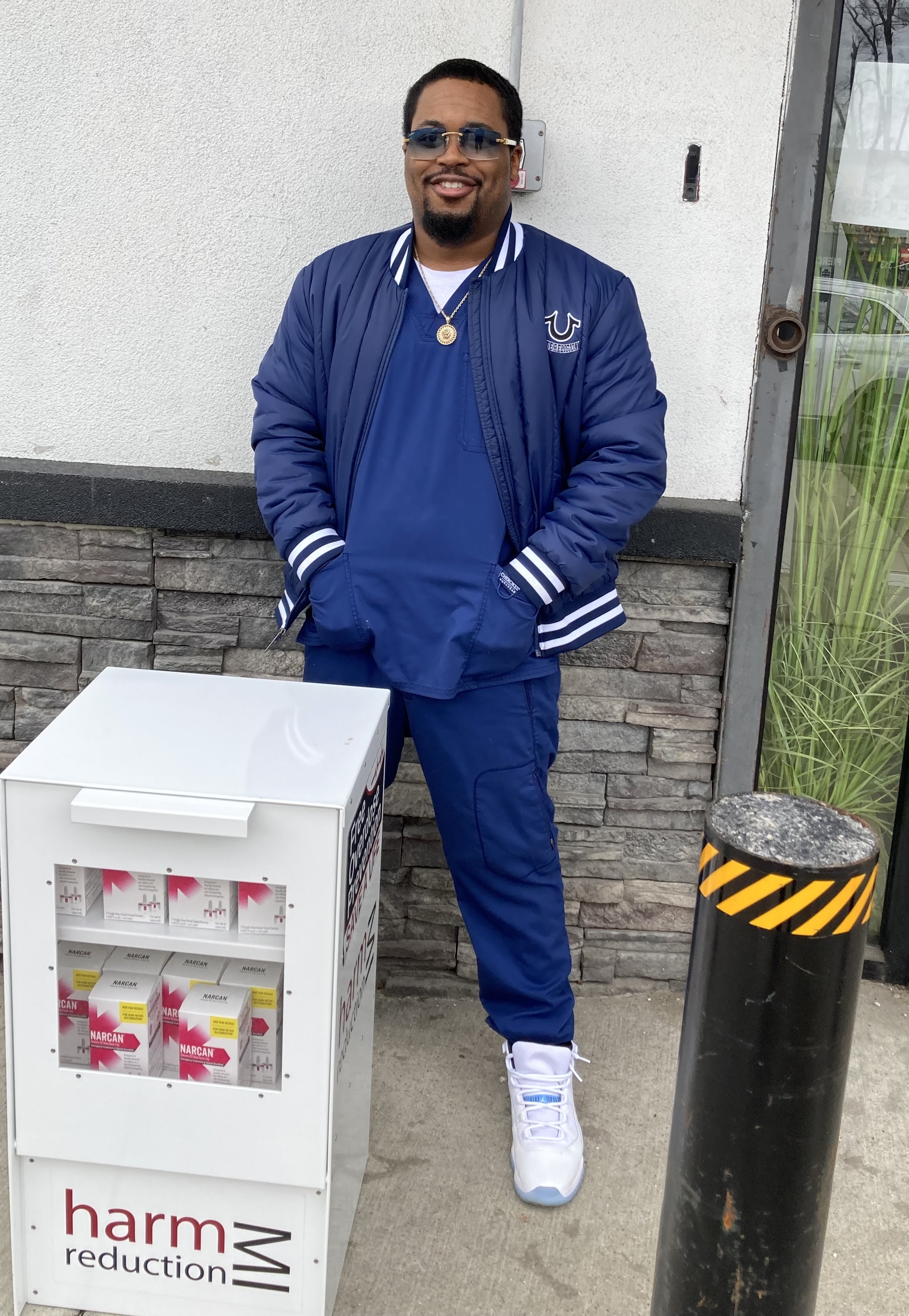HFC Students Bring Narcan to Campus
Gallery

Charles Brooks, president of Phi Theta Kappa, standing behind Narcan dispensary at Henry Ford College, Dearborn MI
Last March, Henry Ford College became one of the first community colleges in Michigan to introduce Narcan nasal spray dispensers to its campus. There are now thirteen dispensers located across the main campus and east campus in all thirteen buildings near the Automated External Defibrillators (AEDs), thanks to the efforts of student leaders in Phi Theta Kappa (PTK) and the Student Nursing Association. The initiative was funded by Dani Hourani, the director of community development at Team Wellness Center, and Harm-Reduction Michigan.
The Centers for Disease Control released a report that states drug overdoses have declined by almost 24 percent over the past year. Despite such promising data, the opioid epidemic, which was declared a national health emergency in 2017, remains prevalent. The Food and Drug Administration (FDA) reports that over 6.1 million Americans aged 12 and older have opioid use disorder.
In 2015, the FDA approved the mass distribution of Narcan nasal spray to the general public. This life-saving medication reverses the effects of an opioid overdose within minutes.
In recent years, Narcan vending machines and distribution boxes have become more widespread in the United States, with major cities such as New York and Detroit installing them. Since substance abuse is most prevalent among young adults, colleges across the country have begun to distribute Narcan on campus.
At the forefront of the Narcan initiative at HFC is nursing student and former president of PTK Charles Brooks. In 2023, the Social Venture Project, a competition for undergraduate students to propose solutions to ongoing social issues with the possibility of winning $5,500 to go towards funding the project, came to HFC’s campus. At the event, Brooks proposed that to help combat the opioid epidemic, Narcan dispensaries can be installed across HFC and surrounding college campuses.
Unfortunately, due to a lack of participation from the other colleges, Brooks and his team had to drop out of the competition. However, Brooks was determined to make his proposal a reality. “I couldn’t let it stop,” Brooks said, “It means a lot to me, knowing what Narcan could have done for my loved ones and friends who have passed.”
To Brooks, the most challenging part of this project was the amount of time it took, given the immediacy of this issue. “It takes no time to save somebody,” he continued. In my head, I’m thinking, for every two people that died, I’m going to save five lives.”
Despite his determination, Brooks hit a roadblock in his initiative last semester. “I set out (on the Narcan initiative) because of nursing,” Brooks shared, “but I backed off, thinking ‘I had gotten this far, but I can’t do it.’” Then, on the last day of January, Brooks received a phone call from Ali Berry, an HFC student and captain of the PTK research team, who has been involved in the Narcan initiative since its beginning. Berry proposed that Brooks meet with him and Abdulaziz Alkhalisi, another HFC student involved in the PTK research team and Narcan initiative, on HFC’s campus to devise what Brooks called a “code of strategy” for the initiative. When the three students arrived on HFC’s snowy grounds later that afternoon, they sat down for hours in the Honors II Program Hub, outlining a new plan of action to overcome this barrier. “It became real,” Brooks shared, “and ever since then, it’s been in motion.”
Berry, who has been taking classes at HFC since age fifteen, expressed experiencing imposter syndrome and attending college while still a high school student. “Being fifteen years old and in these college classes is pretty daunting. You feel like you don’t belong.” Berry said. However, because of an early start in pursuing higher education, Berry became exposed to real-world issues beyond the bubble of high school stressors. “It made me want to escape those confines of those stereotypical student issues and led me to seek out PTK, where you can get involved in community activism.” When Berry was introduced to Brooks through the Social Venture Project, he was eager to join Brooks’ initiative and was met with open arms, joining a team of eleven others. Berry will be transferring to the University of Michigan in Ann Arbor in the fall.
Berry stated that his religion inspired him to get involved in activism such as the Narcan initiative. “I take my religious obligation to do good and to act as my leading priority. As Imam Ali, ‘Peace Be Upon Him,’ said, ‘Knowledge is accompanied by action, for whoever knows, acts. Knowledge calls out for action: if it responds to the call, then it remains. Otherwise, it departs.’”
The long and strenuous process that Brooks, Berry, Alkhalisi, and the Narcan initiative team went through to distribute the Narcan kits across campus has already begun to pay off. “I got a call from someone saying that one of our Narcan kits saved their family puppy.” Berry shared, “He was very emotional in the call, which extends to myself. It was a shock factor for me that regardless of species, you have this project showing the preservation of life itself.”
PTK and SNA students will frequently be resupplying Narcan kits and continuing Narcan training sessions on campus in the upcoming semesters. All students are encouraged to attend to learn how to recognize the signs of an opioid overdose and how to safely administer the Narcan nasal spray.
Although Brooks will graduate in the fall with the plan to transfer to a four-year university to continue nursing, he expressed a desire to continue the Narcan initiative beyond HFC and into his community. Brooks realizes that the opioid epidemic “isn’t going to end” with just one project. With the help of Pam Lynch from Harm Reduction Michigan, Brooks has installed a Narcan dispensary on Westmoreland off of Seven Mile and plans to install one in every neighborhood in Detroit.
